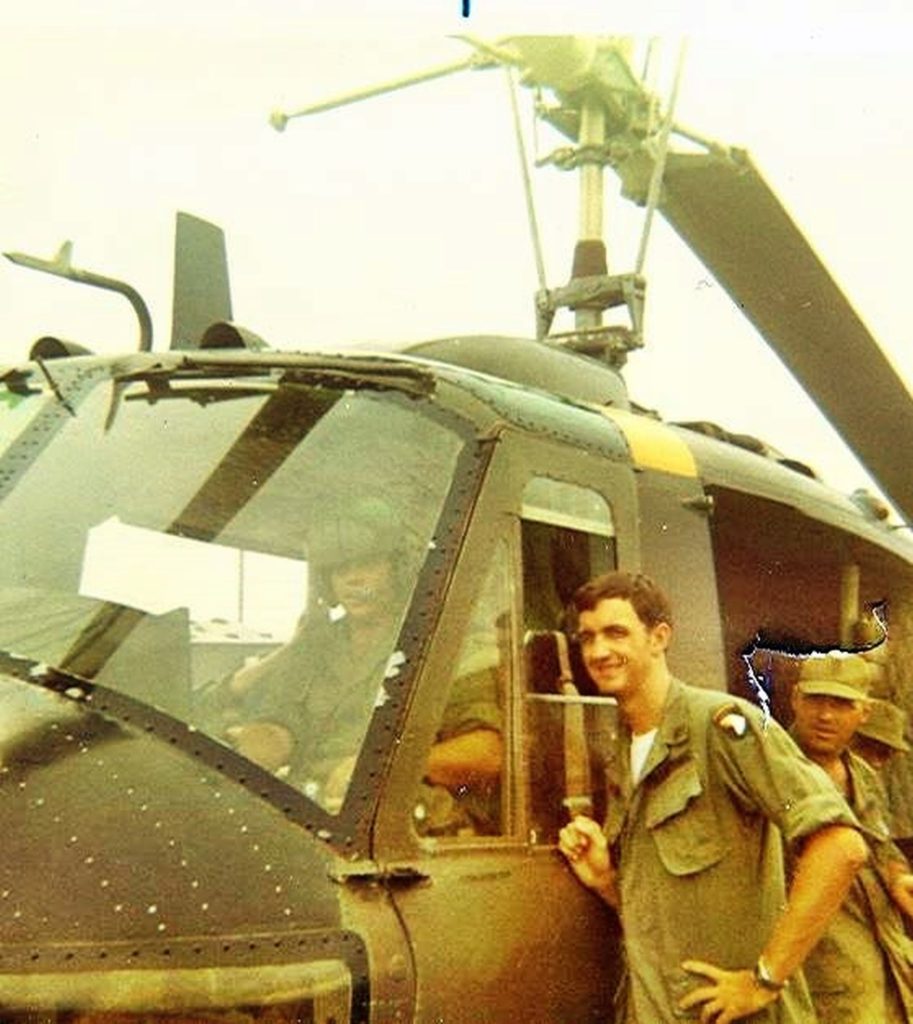
Military
Introduction
The military has played a significant role in my life. It has affected me in both positive and negative ways. In the ten chapters of the Military section below, I am going to take the reader on a journey through my short military life from induction to my experience in the Vietnam War. I will try not to dive too deep as many readers will find this section boring and uninteresting. Nevertheless, I would have been remiss if I had not included this section as the military has played a significant role in who I am.
In the paragraphs below, I describe my military experiences from training stateside to combat in Vietnam. I was greatly affected by the Vietnam War, but I am proud of my service. Watch Video 6 The Military Years below.
Pre-Basic Training
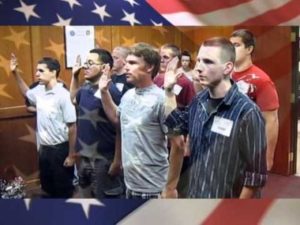 It was February 1969. I was freaking out as I just had received a letter from my local draft board in Charleston. In so many words, the letter indicated that I was to report to the local selective service office in Charleston, Missouri later that month. I would be going with several other Mississippi County young men to St. Louis to take a military physical. Upon reporting and signing in, Mrs. Beck, Clerk of the Selective Service Board in Charleston, informed me that I was going to be the caretaker of orders for the 30 guys from our county that were making this bus trip. She then gave me a folder with their orders to provide to the military personnel in St. Louis. I was quite shocked at this development as I may have been the most shy and least aggressive of all the guys there that day.
It was February 1969. I was freaking out as I just had received a letter from my local draft board in Charleston. In so many words, the letter indicated that I was to report to the local selective service office in Charleston, Missouri later that month. I would be going with several other Mississippi County young men to St. Louis to take a military physical. Upon reporting and signing in, Mrs. Beck, Clerk of the Selective Service Board in Charleston, informed me that I was going to be the caretaker of orders for the 30 guys from our county that were making this bus trip. She then gave me a folder with their orders to provide to the military personnel in St. Louis. I was quite shocked at this development as I may have been the most shy and least aggressive of all the guys there that day.
As it turned out, I did know one of the guys going with us for the physical. He was from Bertrand and was a classmate of my sister. I recognized Dwight Richardson, but I really did not know him very well. I found him to be a very nice fellow. I think that both of us would have rather been doing something else on that day.
Everything went well and everyone in my group arrived in St. Louis and took their physical. Thus, I was relieved. Actually, I had a good group of fellows on the trip and no one really gave me any problems. That really was my first experience at being responsible for others. I am not sure if everyone passed the physical as I was not privy to anyone’s results but my own. I received good and bad news. The good news was that no major medical issues were identified during my physical while the bad news was that I had passed my physical and was to report for induction in early April. My worst fear had just come to fruition. I had been drafted and I was going to be inducted into the military in a couple of months. I think that was the longest two months of waiting that I had ever experienced in my 21 years up to that time. The anxiety was much worse than the fretting in those summer months in 1964 when I had to change high schools prior to my senior year.
April arrived and I reported to the Selective Service Board in Charleston for the second time that year. I was, again, selected to be caretaker of the orders to be taken to St. Louis. This time there were only about 15 men on the bus for this trip from Charleston to be inducted. Once we arrived in St. Louis, my group was merged with several other groups and we were ordered to form a single line. I would venture to guess that there were about 80 of us in the line. Then, the sergeant told us to sound off with numbers in sequence 1-2 starting the sequence over after 2. (In other words, we were divided into two groups based on our number.) It turned out my number was one. At that time, I did not know the significance of this grouping. It turned out that the young men in Group 1 were to be inducted into the Army and the Group 2 men were to be inducted into the Marines. That was somewhat surprising to me that the draftees were assigned to the Army or Marines on a random basis. I do think, however, that a significant number of the men originally in the Marines group eventually ended up with us in the Army group.
My group was then sworn-in and loaded on a bus. As we got on the bus, the harassment began. Up to that point, we had been treated with civility, but now we belonged to the military. After the approximate two or three-hour bus ride, we arrived at the processing station in Ft. Leonard Wood.
Basic Training
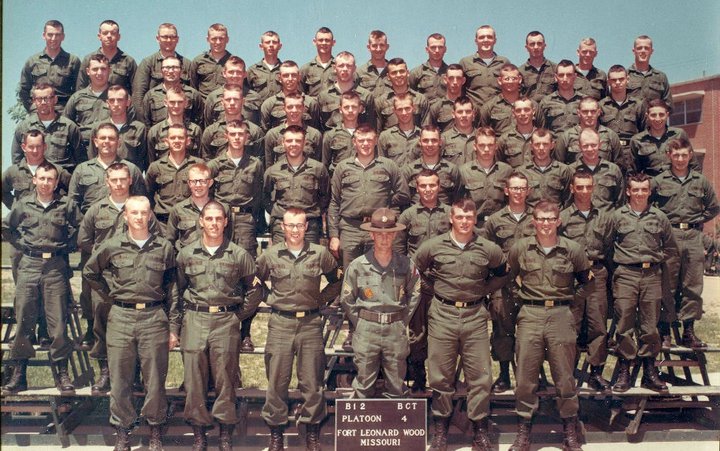
That first day in Fort Leonard Wood probably was the most stressful of my life up to that point. Two drill sergeants met us as we unloaded from the bus. It was just like I had seen in the military movies. The sergeants were screaming and ranting and calling us every bad name in the book. Immediately, one got in my face and told me I was a maggot. I said yes sir. Then he goes into this rant about not being an officer and working for a living. Thus, he was not a sir! I guess I realized then that we would never do anything right while being in trainee status.
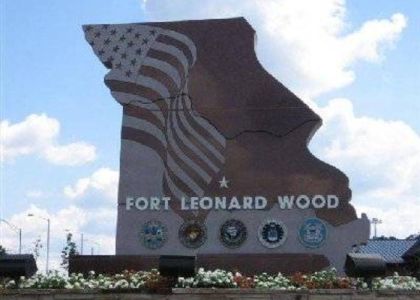 We were herded into a three line formation and ordered to come to attention. Of course, the sergeant did not like the way that we came to attention. We all had to do 10 push-ups. Then one of the sergeants demonstrated the difference between attention and at-ease. Then we were told, when we respond to one of them, the proper response should be “yes, drill sergeant.” The sergeant then said, “let’s see if you have learned anything.” Did you learn anything? Our reply in unison was, ”yes, drill sergeant!” I suppose that we did get the message.
We were herded into a three line formation and ordered to come to attention. Of course, the sergeant did not like the way that we came to attention. We all had to do 10 push-ups. Then one of the sergeants demonstrated the difference between attention and at-ease. Then we were told, when we respond to one of them, the proper response should be “yes, drill sergeant.” The sergeant then said, “let’s see if you have learned anything.” Did you learn anything? Our reply in unison was, ”yes, drill sergeant!” I suppose that we did get the message.
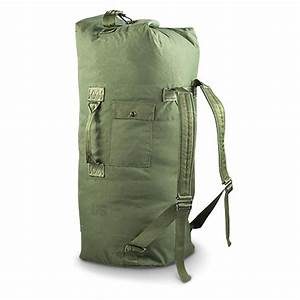 Our next step was to secure our equipment. At each station, there was a sergeant there to harass us. We were first given a duffel bag for storing our equipment. At the next station we were issued our U.S. Army clothes that we would wear for the next eight weeks. This issue included three sets of fatigues, three pair of green wool socks, three olive drab boxer shorts, and two pairs of Army boots. At that point, we were ordered to remove all our civilian clothes and place them in the provided mailing box and to change into our new wardrobe. This box had a mailing label on it. We were instructed to complete the label with our home address, to seal the box, and to drop the box into a bin.
Our next step was to secure our equipment. At each station, there was a sergeant there to harass us. We were first given a duffel bag for storing our equipment. At the next station we were issued our U.S. Army clothes that we would wear for the next eight weeks. This issue included three sets of fatigues, three pair of green wool socks, three olive drab boxer shorts, and two pairs of Army boots. At that point, we were ordered to remove all our civilian clothes and place them in the provided mailing box and to change into our new wardrobe. This box had a mailing label on it. We were instructed to complete the label with our home address, to seal the box, and to drop the box into a bin.
We proceeded to the many stations and filled our duffel bags with numerous pieces of equipment. I cannot believe how heavy these duffel bags became. The sergeants began screaming at us as we all struggled with our bags. Next, we were ordered to get into a formation with our bags placed in front of us. We were then marched to our billets and given 30 minutes to select a bunk and get squared away. I did not care where I slept as long as I got a bottom bunk. No sooner than we got into our room and selected a bed, a drill instructor comes in screaming, “how come your bed is not made up?” Everyone give me 20 push-ups. I already knew that this was not going to be a paradise, but I surely was not expecting all the stupidity and absurdity of the military. I posed a question under my breath, “is this really the military thinking regarding building character, instilling discipline, and molding good soldiers?” It did not take very long for me to answer my own question. Unfortunately, the answer to that question was, “yes”. Surely, there has to be a better way!
After the first formation of the morning of the next day, one of the drill sergeants demonstrated the technique of low-crawling. After his demonstration, we were required to low crawl across the grounds and say hello to our neighboring barracks. After negotiating the monkey bars and doing our pull ups, we were marched to the mess hall. At the mess hall, we lined up for breakfast. We were forbidden from talking and were required to stand at ease in a line before that meal and every meal thereafter at Fort Leonard Wood.
At our formation after breakfast, we were told we all look like hippies and should get our hair cut. I never wore my hair very long but now I was being called a hippie. We were told to ask the barber to cut our hair in a number 1 or number 2 style. If we came back with a number 3 or 4, we would simply be sent back and would be disciplined. I could be an army barber because basically all they do is a buzz-cut. There was really no difference between a number 1 or number 2 style. Either way, one received what the Army termed a “white wall” on the sides. Believe me, it was very short!.
Later that morning, we were marched to the medical, dental, and administrative buildings of the processing center. At this time, we had a very in-depth physical and dental evaluation. Any required vaccinations and shots were administered at this time. At the administrative building, we were given paper and pen and were ordered to write home to let our loved ones know that we are safe and secure. This was the first sensible and decent thing that we were ordered to do.
Upon completing our letter, we proceeded to the next stations where the Army personnel took photos, had us complete some forms relating to pay records and insurance, and inscribed our dog tags. At one of the stations, we were asked to complete a form where we were able to select our ideal Military Occupational Specialty (MOS) and area of duty assignment. (This was called your “dream sheet”) I was happy to select intelligence, clerical, and military police for my favored MOS’s and Hawaii or California for my ideal region of duty assignment. At the last station, a timed test was administered. We had three hours to complete this test. I was finished in two hours but waited until the three hour period was over. Why would I want to leave the quiet testing room so that a loud drill instructor could scream at me.
I had never marched prior to the military and, as a non-hunter, I had fired a weapon very few times in my young life. The cadre probably thought that they had another Gomer Pyle on their hands, as it took me a while to catch on to the about-faces and to the rear march commands. I was very good with the “route step march” command. Initially, I had difficulty with a left-face and a right face, but, after a while, I could distinguish my left from my right foot.
I really never got used to all the harassment. I did my fair share of push-ups and got into the best shape of my life during basic training. One thing that I had difficulty with initially was the monkey bars. Once I got the hang of it, it wasn’t that difficult. It’s more a matter of rhythm than it was strength. Pull-ups were a different issue. I think that pull-ups are a strength thing; however, it did appear that the shorter fellows always outperformed the taller guys.
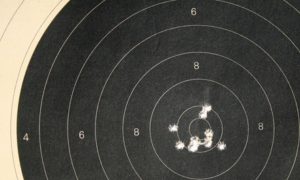
I hated the rifle range as I could not hit the “red side of a green barn”. I had great difficulty zeroing my weapon which required that one get three shots in a very tight shot-grouping. Eventually, the drill sergeant did it for me – using a pencil. I am happy to report that I am a sharpshooter. So this is how the military works? I don’t think that the Army bolos many trainees on the rifle range. After all, the rifle was not going to be that important to me, as I was going to be a clerk in Hawaii!
One thing that I vividly remember is how the military uses the concept of road guards. The drill sergeants would designate who the road guards were going to be each day for the platoon. Road guards had to post every time that our formation crossed a road. The road guard would have to stay at his post until the platoon behind him in the formation posted their road guard to replace him. This meant that the road guards had to run ahead to get in front of the formation and after the platoon cleared the road, they had to catch up. Who were the road guards? You guessed it. They were the trainees that could not keep up. Very often they were the fellows that were overweight. The process generally worked as many of the road guards lost a significant number of pounds. It finally got to the point that the same few guys became the road guards on a permanent basis. When we were approaching a road, the drill sergeant calling cadence would shout, “road guard, post!”
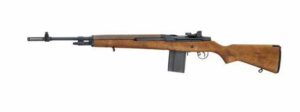
The remainder of my basic training was uneventful until the last week. I got some bad news about 10 days from the end of basic training. I was one of the 20 or so men that had to go to the range and fire M-16s. The M-14 rifle in the picture above was the standard issue rifle for our basic training. What does this mean? The M-16 is a much lighter and easier to maneuver weapon, but why do I need to fire it? I am going to be a clerk in Hawaii.
During the last week of basic training, we had a battalion baseball tournament that all the drill sergeants took very seriously. I was the shortstop for our platoon and led our team to the battalion championship. The previous weekend, I had played a pickup basketball game on Saturday with the younger of our drill sergeants. He asked me to play on his team the next day. Do you believe that we actually had a pass on the last two weekends of basic training? That happened to be the only passes we got during the entire cycle.
During the last formation of basic training, I received good news and bad news. The good news was that I was one of three soldiers from my platoon that was being promoted to E-2. That came as quite a surprise to me as I certainly was not an exemplary soldier. I think it had more to do with the drill sergeants appreciating my athletic skills. (Life is not fair!) The bad news was that my next assignment was Infantry Advanced Individual Training (AIT) in Fort Lewis, Washington. Glen was leaving for Ft. Lewis on the next day. I was quite shocked to say the least. (Life is not fair!)
We did have a graduation ceremony. It was nice to see some familiar faces. My sister and my brother and his family drove to the ceremony. I certainly was glad to see them, but I did not like their questioning me, “don’t they feed you here”? (I was extremely thin and looked very frail!)
Well, the 19 soldiers that had previously fired M-16’s with me were put on buses with 60 other troops. All 80 of us were then bused to St. Louis to board a plane bound for Seattle, near Fort Lewis, Washington. This happened to be my first flying experience. As had been the case in the past, I was, for the third time, designated as the caretaker of the orders for the 80 soldiers. (Why was I always selected? It certainly could not been that I looked tough?) This time, I was a little bit more nervous as I was afraid that one of the guys might go AWOL on me. Fortunately, that did not happen and we all arrived safe and sound in a cold and damp Washington.
Advanced Individual Training
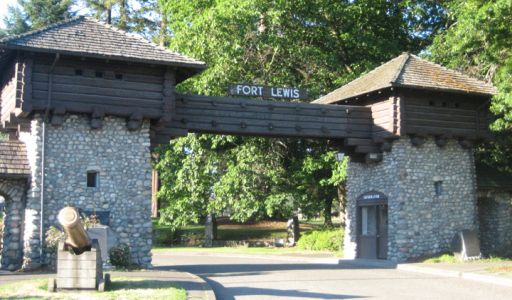 It was near the 20th of June when we arrived in Washington. I had enjoyed my first flying experience. It lasted almost four hours and I was able to get some shut-eye! Wow! Washington was beautiful, but it was also very cold. We had to wear our field jackets almost every day in June and on some days in July. In contrast, it had been very hot and humid when we left Fort Leonard Wood. Also, we received a lot of early morning rain at Fort Lewis.
It was near the 20th of June when we arrived in Washington. I had enjoyed my first flying experience. It lasted almost four hours and I was able to get some shut-eye! Wow! Washington was beautiful, but it was also very cold. We had to wear our field jackets almost every day in June and on some days in July. In contrast, it had been very hot and humid when we left Fort Leonard Wood. Also, we received a lot of early morning rain at Fort Lewis.
I will never forget the bus ride to Fort Lewis from the airport. When I looked out the window and had a full unobstructed view of Mt. Rainer for the first time, I could not believe its beauty. It was magnificent and I was going to be able to see it up close every day for eight weeks. I thought to myself, I would like to visit this state some time when I did not have this little side thing called military going on!

I have never particularly liked running; however, if one must run, I cannot think of a better place than Ft. Lewis. Every morning before breakfast, our platoon would take a two mile run toward Mt. Rainer. Since the run was not optional, I decided I should make the most of it. What a beautiful run it was! Washington is known as the evergreen state and it also has a lot of wildflowers. Finally, the morning air, while brisk, was so clean and refreshing. After the exhilarating run, I always had a good appetite. The problem was there was not enough food and too little time to eat the little that was available. I was able to eat as much as I wanted when I pulled KP (kitchen police) duty. I think I had the bad luck of pulling KP three times during the eight weeks that I was there.
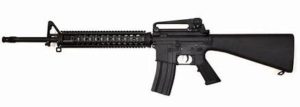
The training at Fort Lewis was very similar to that at Leonard Wood with one caveat and that caveat was significant. The training had a component that was very related to combat. Of course, we trained with the M-16’s (see picture above) We expended a large amount of time cleaning and taking the M-16’s apart and putting them back together. It got to the point that I could do it blindfolded. We also fired these weapons very often during that training cycle. The M-16 is significantly less accurate than the M-14.
Again, I qualified as a sharpshooter. When on the range, I often could not even see the popup targets. I would just fire and the range instructor would say “you got it” or “good shot.” I had a hard time not getting the big head as I was hitting targets that I could not even see. In all honesty, accuracy is not that important as the M-16 is best when fired on the automatic setting. It is recommended that one fire in thee, four, or five shot bursts. In a battle, fire power is king. The M-16 rifle can get very hot as you fire it. It is very light and has a strange ping sound when fired. We were actually told that if we ever run out of ammunition to start screaming bang-bang-bang-bang. I am serious.
We also had a lot of classes in hand to hand combat. They taught us just enough to get ourselves killed. For me, I would really have to be in dire straits to employ hand to hand combat. I think that I would rather try to outrun an enemy combatant! I was really good at tossing hand grenades. I could put them right where I wanted to. At first, I thought that possibly my baseball experience had some relevance, but then I realized that one lobs or tosses a grenade rather than actually pitching it.
The training cycle definitely had a Vietnam component. I do discuss the Vietnam war games component in an article below that I have entitled “Vietnam and Me”. The idea that I was going to be stationed as a clerk in Hawaii was still seated in the back of my mind. Surely, the Army would not have asked me what I would like to do and where I would like to go if they were not serious or would they? Yes, I was a little naive.
One thing I did enjoy while I was at Fort Lewis was that I was able to visit the Seattle area on three or four weekends. In fact, we received a pass almost every weekend that I was there from noon on Saturday until 4:00 PM on Sunday. I really liked Seattle as it was very different than any other place that I had ever visited previously.
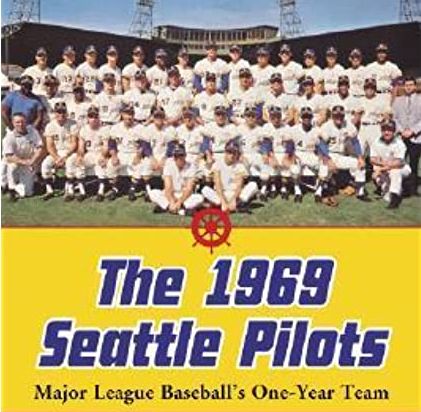 I actually was able to attend a baseball game between the Seattle Pilots and the New York Yankees while I was there. That is a big deal because the Seattle Pilots were only in Seattle for one year prior to becoming the Milwaukee Brewers. Also, I can remember watching the return of Armstrong, Aldrin, and Collins to the earth in July of 1969 in our orderly room with about 50 other soldiers on one Sunday afternoon. Yes, that was very exciting.
I actually was able to attend a baseball game between the Seattle Pilots and the New York Yankees while I was there. That is a big deal because the Seattle Pilots were only in Seattle for one year prior to becoming the Milwaukee Brewers. Also, I can remember watching the return of Armstrong, Aldrin, and Collins to the earth in July of 1969 in our orderly room with about 50 other soldiers on one Sunday afternoon. Yes, that was very exciting.
NCO Academy (Part 1)
 At the end of my AIT cycle in late August, I received really bad news. I now can forget about a Hawaiian luau. I was definitely going to Vietnam. I have received orders to Fort Benning, Georgia, where I was to attend the United States Infantry School. The main purpose of the school was to train squad leaders for Vietnam. I did receive a 10-day leave before I had to report to Fort Benning.
At the end of my AIT cycle in late August, I received really bad news. I now can forget about a Hawaiian luau. I was definitely going to Vietnam. I have received orders to Fort Benning, Georgia, where I was to attend the United States Infantry School. The main purpose of the school was to train squad leaders for Vietnam. I did receive a 10-day leave before I had to report to Fort Benning.
I really enjoyed my short 10 days at home as I had not seen my mom or dad for about four months. I suppose I did spend a lot of time thinking about Vietnam. I had to report to Fort Benning, Georgia, in early September 1969. I can remember driving my car to Georgia after stopping to visit my Alabama relatives in Thorsby. I had no idea what was in store for me at this next step in my training.
At the United States Infantry School, harassment was king. It was awful and many times worse than basic training and AIT. As it followed the curriculum of Officer Candidate School (OCS), it had an academic component and a practical component. We spent a lot of time in the classroom. I liked the classroom component as the cadre could not harass us too much in that setting. It was a different story if one snoozed during the classes. That was very easy to do as our days were very long and tiring. We were asked to just stand if we got sleepy. Fortunately, I did not have to do any push-ups for being a sleepy-head. It was more likely that I just did not get caught instead of my not sleeping during some of the classes!
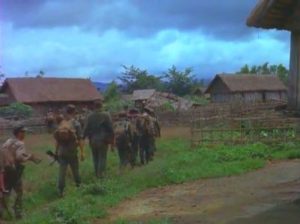
Much of the outdoor practical training was centered around what it was going to be like in Vietnam. We trained using many different scenarios and many different replicas of Vietnam villages, I must say the training was very good and realistic and that I paid attention. Did I already mention that I now knew that I was not going to be a clerk in Hawaii?
I will state that December in Columbus, Georgia can be very chilly. In fact, I do not know if my winters in Missouri were that much colder. With this description of the December weather, I will lead-in to my last day at the academy. We were taken to a confidence course. There was an 8 inch wide cross tie about 50 foot long that was positioned about 30 feet above a river. There was a thin layer of ice on the cold river. At the end of the cross tie and over the river was a two or three inch diameter cable that was almost parallel to the water and it was taut. About 15 feet out on the cable was a red flag. Each candidate had to climb up a 30-foot ladder to the cross tie, balance himself on the 8 inch wide cross tie, walk the length of the 50 foot cross tie, and move upside down, using one’s hands and feet, on the cable out to the red flag. Once at the red flag, the candidate would make a request to the tower to drop into the water below. I said, “sir, Candidate Morrow requests permission to drop!” My commanding officer replied, “drop Sergeant Morrow.” I will never forget how cold that water was and how the shock of hitting the water from about 25 – 30 feet above paralyzed me for a few seconds. I was so glad to get out of that water. We, then, had to wait, while shivering, until the bus was full before we could be taken back to the barracks. Candidate Morrow was now a full-fledged NCO.
Upon graduation from the NCO Academy of the US Infantry School, I received orders to report to Fort Polk, Louisiana to complete the last eight weeks of training for the Infantry School (on the job training). My next duty was to be a drill sergeant at Fort Polk for an Infantry AIT cycle. These men that I would be training for eight weeks would also be going to Nam.
I had received a 10 day leave and had to report to Fort Polk on January 2, 1970. I graduated from the NCO Academy on December 21, 1969. While home, I met one of the best friends that I have ever had. Bill Bye was a friend of my sister, Kay. He and I had common interests in basketball and the Cardinals. We both were sports fanatics. I will return to my new friend, Bill, and his role in my life later in this section.
NCO Academy (Part 2)
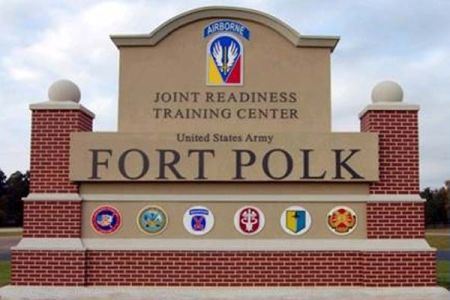 After arriving at Fort Polk, I immediately checked in to the battalion headquarters. It was 8:00 AM and I do not think they were ready for anyone that early. I had driven since 11:00 PM and arrived in the early morning at Fort Polk (about 8 or 9 hours). Eventually, I was assigned to a specific company. After reporting to my new company (only about five or six buildings away), I was assigned to a specific room in a specific barracks. That was different, as in all my prior military assignments, I always had to sleep in a large bay room that accommodated as many as 20 – 30 other soldiers. This time I was part of the cadre and not a trainee.
After arriving at Fort Polk, I immediately checked in to the battalion headquarters. It was 8:00 AM and I do not think they were ready for anyone that early. I had driven since 11:00 PM and arrived in the early morning at Fort Polk (about 8 or 9 hours). Eventually, I was assigned to a specific company. After reporting to my new company (only about five or six buildings away), I was assigned to a specific room in a specific barracks. That was different, as in all my prior military assignments, I always had to sleep in a large bay room that accommodated as many as 20 – 30 other soldiers. This time I was part of the cadre and not a trainee.
Sgt. Gerald Mauney was my new roommate. Although I did not know Sgt. Mauney very well, I had spoken to him two or three times at the Academy. At the school, he was not in the same platoon as me. I do recall that on the very first day of NCO Academy, he was selected as the First Sergeant. I thought he did fine, but as the first candidate to be in charge, he caught a lot of flack. The Infantry School cadre used him as an example. He was berated for his lack of voice inflection. Instead of “forward march” or “Attention” they wanted to hear aaaa—–ten—-hun and for——ward haa-rch. Also, they did not approve of his salute. What was his punishment? Gerald had to go through the process of calling a telephone pole to attention with a deeper tone of voice. Then he had to salute that pole. He was ordered to keep this process up until he was told to stop. He was humiliated for about 60 minutes. That. is an example of the stupid and demeaning harassment that we faced.
Another example occurred at 2:00 AM one morning, as we were awakened and told to remove our mattresses from our beds, march with them above our heads for about 100 yards, bury the mattresses in the sand, put a little flag identifier on them, and return back to our barracks, and wait for further instructions. About 15 minutes later, another drill sergeant comes into the barracks screaming, ”where are your mattresses?” Well, one gets the idea. The Army really builds character?
Gerald was a great guy and we became very good friends. He was a very good Christian example for everyone. He was kind, gentle, and compassionate and looked at least 15 years old. I think he actually was 21. I truly enjoyed my time as a drill sergeant and as a leader of the ten soldiers who were headed for Vietnam. My squad of ten guys really performed well during the eight weeks period. I enjoyed sharing tips from my training at the Academy. I will admit that we received some resentment in our company from some of the older cadre as it had taken some of them ten years to obtain the same rank that it had taken us less than a year. (We were referred to by some as “shake and bake” and “whip and chill” sergeants.)
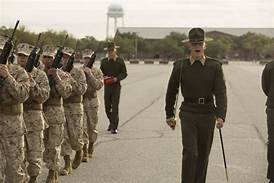
As part of our NCO training, my seven fellow NCO’s from the School were required to act in all company capacities at one time or another. That meant that I moved from positions as the commanding officer, the executive officer, the first sergeant, the platoon sergeant, and of course squad leader. In the end, I feel that I became a good leader – much better than I would ever have expected. I now had confidence that I could be a good squad leader in Vietnam. Glen’s next duty would be Vietnam.
If I remember correctly, I had a two-week break prior to going to Vietnam. I was very glad to see my folks and friends back home in Bertrand. That two-week period appeared to fly by. On my last night at home prior to leaving for Vietnam, my new friend Bill Bye, threw a great going away party for me in Sikeston. What a guy!
I said my sad goodbyes to my parents at 3:00 AM that next morning. (It was extremely emotional!) Bob Bye, Penny Singleton, and my sister Kay drove me to the Memphis airport. At the airport, we met Gerald’s family, and like Gerald, they were great people. We both said our goodbyes to our families and friends and went on our way – a flight to San Francisco. After arriving in San Francisco, Gerald and I had a short helicopter ride to Oakland.
All army personnel heading to Vietnam in the late 60’s departed from the Army Processing Center in Oakland, California. Gerald and I were there for four days before we shipped out (flew out). Our flight was something like an 18 hour flight as we stopped in Hawaii, Wake Island, and the Philippines before landing in Long Binh, Vietnam. It was a very hot and sticky day in Vietnam. Weren’t all of them?
South Vietnam
The first thing that I noticed as we were bused from the airport at Long Binh to the receiving station in Vietnam was the stench of the country. The odor was one that I had never experienced before. (And you do not want to know what that smell turned out to be!) I also immediately noticed the poor housing conditions and the cats and dogs that were running on free reign. The people were so small and sat on their hunches around small fires with cooking pots hanging over the fires. Behind many of the huts were grazing water buffaloes. It was so eerie. Then I would hear the sounds of explosions and light weapons. This was going to be a tough tour of duty.
Upon arriving at the receiving center, we were assigned to a very crowded barracks as hundreds of Army troops were arriving each day and were waiting for orders for their next duty assignment in the Republic of Vietnam. I think I had been at this receiving station for two days when I received my new orders. I was assigned to the 101st Airborne and was to report to Camp Evans, the Brigade headquarters, near the DMZ. Gerald had received the same orders.
Arriving at Camp Evans, we were immediately subjected to what the Army called “in country” training. We learned about the Cheiu Hoi program and all about sappers. The first term applies to a program where the enemy was encouraged to come over to our side and work with us. I worked with several ‘cheiu hoi’ Vietnamese when I was in the boonies. The term ‘sapper’ describes the enemy combatants that could break your line of defense without your knowledge. Generally, sappers would crawl under and/or cut our defensive wires and get inside our perimeter during the night hours without our knowledge. I really had no idea of their skill until I saw a demonstration in April of 1970.
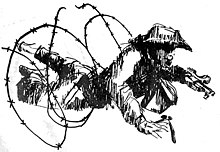
After “in country” training, we were assigned to our specific battalions. I was assigned to the 3rd of the 506th Infantry and Gerald was headed to the 1st of the 502nd Infantry. We parted company in the middle of April 1970. I had no idea when I would see Gerald again.
Now, I was finally out in the boonies with my new company. One other noobie (newbie, noob, or cherry) was dropped off with me by chopper at dusk so I really did not get to meet anyone but my platoon sergeant that night. He told me to just keep my head down and stay in the foxhole that night and if I listened to him, I would have a real good chance of returning to the real world. I always remembered that instruction and always had the highest regard for that platoon sergeant, Sgt. Buckner. That first night was amazing as I saw flashes and the sound of mortar fire all around me. It lasted until daylight the next morning. I think that I may have heard the platoon leader call out “incoming” at least three times that night. The next morning, I met everyone in my squad.
After three or four weeks in Nam I received a letter from Gerald’s commanding officer in response to a letter I had written to Gerald. It was a letter that I did not want to open. I finally mustered enough courage to open it. The letter read, “Sgt. Gerald Mauney was killed in action on ……….……”. I was paralyzed from the shock! Gerald was a great guy and wonderful Christian example. He loved, God, family, and country. I was totally devastated.
Combat
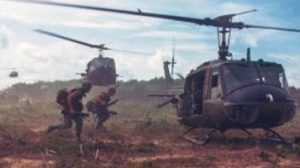 During my first two or three weeks in Nam, I had very little contact with the enemy; however, in early May of 1970, that changed. (see article entitled “Vietnam and Me” below.) At 8:00 AM, we boarded choppers in Pleiku, South Vietnam and headed to the Parrot’s Beak area of Cambodia. As soon as our choppers approached the landing zone (LZ), they came under heavy enemy fire. This was a very hot LZ! Welcome to Cambodia and welcome to real combat.
During my first two or three weeks in Nam, I had very little contact with the enemy; however, in early May of 1970, that changed. (see article entitled “Vietnam and Me” below.) At 8:00 AM, we boarded choppers in Pleiku, South Vietnam and headed to the Parrot’s Beak area of Cambodia. As soon as our choppers approached the landing zone (LZ), they came under heavy enemy fire. This was a very hot LZ! Welcome to Cambodia and welcome to real combat.
Cambodia definitely was the worst combat of my tour as we were there 10 days and had skirmishes with the enemy each day. On May 10, 1970, as my platoon was crossing the Se San River, it was ambushed and surrounded by a well-armed NVA battalion. We called in air strikes, artillery, and gunships. We eventually were rescued by a sister company that was dropped into a LZ about 2 miles away from our location. They had to walk all night through the dense jungle to reach us in the early morning hours. Ultimately, without their assistance, we would have all perished. Unfortunately, we lost two men from my squad and eight from our company during those 10 days. (Those deaths absolutely devastated me.) We later learned that we were at the doorstep of the largest cache of enemy food and weapons captured during the Vietnam War. That would explain why the huge enemy force was there. My unit was awarded the Valorous Unit Citation which is the unit equivalent of an individual’s Silver Star.
On the day after the ambush, I had to be medevaced to a makeshift hospital in Pleiku. I had a serious heat stroke after helping carry the dead bodies of my fellow soldiers through the dense jungle to a clearing to be air lifted out of Cambodia. We hung our panchos across two rifles to make a litter. It took four of us to carry one body – one man on each end of two rifles. It was an incredibly difficult task given the terrain and our makeshift litter. We also feared being the target of another ambush. I was placed on the chopper with the wounded soldiers on that medevac. I eventually flew to a major hospital in Danang and stayed there for a week to get replenished with IV’s
The remainder of my Vietnam experience was pretty calm as I spent time in Ban Me Thuot and An Khe. The 3rd of the 506th moved to Phu Bai, near Hue, in November of 1970 and I finished my tour roaming the A Shau Valley. There were a few minor skirmishes but nothing compared with my experience in Cambodia. I left Vietnam in January 24, 1971, and returned to Southeast Missouri State University to complete my degree.
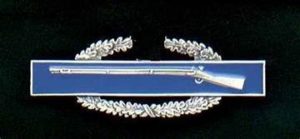
I do not want to make too much noise about my military medals, but I will never say that I am not proud of them. (What John Kerry did with his medals was despicable!) I was awarded the Bronze Star with a V Device and a purple heart (for a heat stroke and some minor scrapes and scratches?) My most cherished medal, however, is the CIB (Combat Infantry Badge) as only my fellow infantrymen can earn that award. The CIB is earned only from being the “boots on the ground” in a hostile environment.
Final Thoughts

How did war affect me? After almost 50 years, loud, unexpected noises still startle me. The shape of some lampshades remind me of ‘non la’ hats when I suddenly awaken at night. I absolutely abhor guns and hate tent camping. However, I came home more appreciative of the simple things. I am more motivated; more attentive to detail; more assertive; more confident; more goal oriented; more serious, and more driven. Yes, war has had a lasting effect on me.
I love this country and harbor no ill feelings about being drafted or serving in Vietnam. I continually thank the Lord that I made it through the war without the physical, emotional, and mental scars that many of my fellow soldiers have had to endure. Many, like my friend and roommate, Gerald, gave the ultimate sacrifice. I would like to think that I am a stronger, better person due to my service.
As I look back, I simply think of Vietnam as simply a dark chapter in my story. I have experienced others; nevertheless, I have experienced many more bright chapters that have helped to erase that pain. Many Vietnam vets came home to “‘parades of disrespect” while others came home to “walls of silence”. No one had ever uttered the words to me, ”thank you for your service” until 2007 or 36 years later. A lady in my church dinner group in Sequim, Washington actually said those words to me. I will not try to explain how good that made me feel!
I absolutely understand why someone would not have wanted to or possibly was afraid to even broach the subject. I have had many people say to me, “I didn’t think that you wanted to talk about it.” I have found it very helpful to talk and write about my experiences. Yes, it may make me a little uncomfortable, but those feelings and experiences were real and, for my peace of mind, need to be shared. I have heard the expression, “wow, that really lifted a burden off of my shoulders.” I suppose this may be a similar thing.
In June 11, 2019, I was able to go on the Land of Lincoln Honor Flight #56 to D. C. to visit the war memorials. (see article entitled “My Honor Flight).That experience was so humbling and I shed a lot of tears. It was so rewarding to be honored for what I endured over 48 years ago and to share that wonderful day with 83 other veterans from the Land of Lincoln area.
I am so glad that no one ever spat on me or called me a “baby killer”. I do not know how I would have reacted. I can only say that I am very thankful that I made it home safely. During this time of difficulty, I never underestimated the power of faith and prayer. The Lord was and still is my shepherd!
Article - Honor Flight
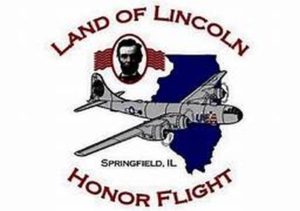 Have you ever been treated like royalty? Have you ever zipped through the incomparable D.C. traffic as if it was at a standstill? Well, I have. It happened to me yesterday. After a pre-flight dinner on Monday night, I had the privilege on Tuesday, June 11, 2019, of going with my fellow veterans on the Land of Lincoln Honor Flight # 56 to Washington D.C. One WW II, 20 Korean, and 63 Vietnam-era veterans left Capital Airport in Springfield, Illinois at 6:15 AM on a Sun Country charter flight to visit the war memorials in our country’s capital.
Have you ever been treated like royalty? Have you ever zipped through the incomparable D.C. traffic as if it was at a standstill? Well, I have. It happened to me yesterday. After a pre-flight dinner on Monday night, I had the privilege on Tuesday, June 11, 2019, of going with my fellow veterans on the Land of Lincoln Honor Flight # 56 to Washington D.C. One WW II, 20 Korean, and 63 Vietnam-era veterans left Capital Airport in Springfield, Illinois at 6:15 AM on a Sun Country charter flight to visit the war memorials in our country’s capital.
Upon arrival at the Reagan National Airport in D.C., we deplaned to a surprisingly large crowd of people and applause at our landing gate. As we proceeded through the airport, we had to negotiate a gauntlet of well-wishers. I never got tired of the “thank-you for your service”, clapping, and handshakes as it continued outside to our bus boarding area. Folks of all ages participated in this welcome. They consisted of military, law enforcement, airport personnel, tourists, and mostly local private citizens. Once on one of our three buses, we headed downtown to visit the Navy Memorial. Our bus driver informed us that travel from the airport to this memorial at this time (early rush hour) usually took anywhere from 1-3 hours. But, not on this day! It was hard to believe, but we had a police escort to down-town and it took only about 20 minutes for the trip. A motorcycle policeman with his siren screaming led our contingent of buses and a squad car with its flashing lights and siren blasting followed. It was amazing to see how smoothly we zipped through the traffic (weaving from lane to lane and going through red stoplights repeatedly) with this assistance. The police escort was with us from 8:00 AM – to 1:00 PM so we had ease of movement throughout the city. Of course, we had a local politician waiting at the memorial to greet us (U.S. Congressman Rodney Davis). At the end of the day, we had the privilege of watching the ceremonial “taking down of the U.S. flag” and the “Changing of the Guard” at the Tomb of the Unknown Soldier in Arlington National Cemetery. Wow, how moving was that? And upon our return to Reagan National we were welcomed back by a long line of smiling well-wishers. I was one of a few lucky veterans, as a beautiful young lady hung a lei around my neck.
On our return to Springfield Capital Airport at approximately 10:00 PM that night, I was humbled and brought to tears as we were greeted by thundering applause by an enthusiastic, loud crowd of appreciative local compatriots. I heard someone say the estimated crowd was 1,800. A band serenaded with patriotic music. A bagpiper led our procession. Once again, we were honored to walk through a crowd of appreciative well-wishers as people packed both sides of the narrow hallways of the airport. (I think that I may have shaken more than 1,000 hands during this memorable day. No, politics is not in my immediate future! The rush was incredible but I guess I would never like it ‘that’ well! ( lol ) On our return flight, we were surprised to receive a “final mail call”. Thanks to all for mailing your kind comments and well-wishes. They are most appreciated. It was a warm and wonderful homecoming that made us all proud to be veterans. I think I can speak for all veterans on Flight #56 and say, “thank you, compatriots of Central Illinois for this wonderful tribute that you bestowed on us!” I will always treasure that memorable and emotional day!
I left Springfield with two goals. First, I wanted to pay tribute to all veterans who have served in the Armed Services, particularly all those veterans who gave the ultimate sacrifice. More specifically, I wanted to honor the memory of five soldiers that I had a personal or other connection with including James Gordon Morrow, Gerald C. Mauney, Thomas Glen Naile, John David Plummer, and Carl Mays. Yesterday, I shed a lot of tears.
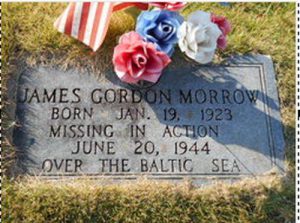
My Uncle Gordon’s Grave Marker James Gordon Morrow was my uncle, who was lost at sea when his aircraft was shot down over the Baltic Sea in 1944. Of course, I never met him, but some of my older relatives frequently compared me to him – citing similar personality characteristics. His picture was prominently displayed in all of his siblings’ homes, including ours, during my childhood. That picture of Uncle Gordon has always had a profound effect on me and I have always felt a unique connection to him. His death, understandably, had a very significant effect on my dad as Gordon was the brother closest in age. Growing up, we were basically forbidden from watching war movies at my house. Ironically, Marlene Miller Morrow and I are planning to cruise the Baltic Sea during the first two weeks of July. That will be emotional for me. RIP, Uncle Gordon.
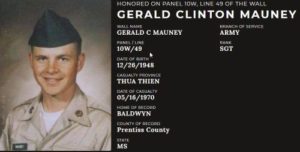 Gerald Clinton Mauney was a classmate at the United States NCO Infantry Academy at Fort Benning Georgia. Later, Gerald was a fellow drill instructor and roommate at Fort Polk, Louisiana and was my best friend. We left for Vietnam from Memphis together in April of 1970. Unfortunately, Gerald was killed in action about 30 days after arriving in Vietnam. One of my favorite keepsakes is a touching letter that Gerald’s mom sent to my mom after his death. He was the best Christian example that I have ever known! RIP, Gerald.
Gerald Clinton Mauney was a classmate at the United States NCO Infantry Academy at Fort Benning Georgia. Later, Gerald was a fellow drill instructor and roommate at Fort Polk, Louisiana and was my best friend. We left for Vietnam from Memphis together in April of 1970. Unfortunately, Gerald was killed in action about 30 days after arriving in Vietnam. One of my favorite keepsakes is a touching letter that Gerald’s mom sent to my mom after his death. He was the best Christian example that I have ever known! RIP, Gerald. 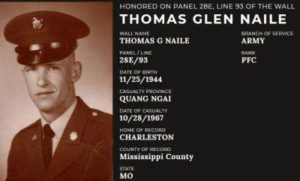 Thomas Glen Naile (Buddy)
Thomas Glen Naile (Buddy)
was the brother of one of my best friends, Charlie (Snubby) Naile, growing up in Bertrand, Missouri. He was married to Cerese Sweeley (Russell), one of my classmates. Buddy was always very nice to this ‘snot-nosed’ friend of his little brother and certainly was one of the “good guys”. I have been acquainted with his family all my life. Aubrey and Helen Naile were long-time friends of my dad and mom. His oldest brother, Jerry Don, used to vacation with my family as he was a good friend of my older brother, Bob. In our college years, Charlie (Sandy Baker Naile) and I took weekend and holiday trips to visit his late sister, Peggy Lane, and her family in Corning, Arkansas. I attended church services with all his younger siblings at the First Baptist Church of Bertrand. Buddy’s siblings, in birth order were: Jerry Don Naile, Peggy Lane (deceased), Shirley Eldridge, Charles Naile, Judy Brown, Larry Naile (Sticky), Danny Naile, Davey Naile, Sandi Naile-Alberson, and Gary Naile.) RIP, Buddy.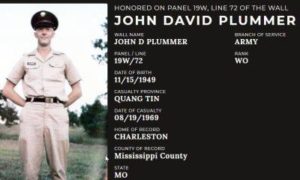 John David Plummer was closely associated with Charleston athletic teams as a manager-helper when I attended Charleston High School in the mid 60’s. He was beloved by all and was referred to as “Lightning”. His sister Linda was a classmate. His mom was the Home Extension Agent for Mississippi County and his dad operated a machine shop/gas station near the Bertrand Retirement Home in the 60’s or 70’s. RIP, “Lightning”.
John David Plummer was closely associated with Charleston athletic teams as a manager-helper when I attended Charleston High School in the mid 60’s. He was beloved by all and was referred to as “Lightning”. His sister Linda was a classmate. His mom was the Home Extension Agent for Mississippi County and his dad operated a machine shop/gas station near the Bertrand Retirement Home in the 60’s or 70’s. RIP, “Lightning”.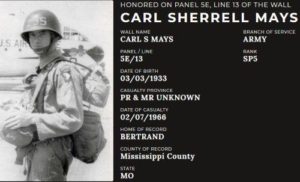 Carl Sherrell Mays’ residence of record was Bertrand. As Carl was 14 years older than me, I did not know him or his family. I, however, wanted to include him in my tribute, as we not only shared home towns but also were 101St Airborne brothers. RIP, Carl.
Carl Sherrell Mays’ residence of record was Bertrand. As Carl was 14 years older than me, I did not know him or his family. I, however, wanted to include him in my tribute, as we not only shared home towns but also were 101St Airborne brothers. RIP, Carl.
I would like to thank the Land of Lincoln Honor Flight Program for allowing me this opportunity to visit the memorials and the National Air and Space Museum in Chantilly, Virginia. The day went without a hitch as the Lincoln Honor Flight Program personnel had an excellent game plan and exquisitely followed it. (Obviously, it was not their first rodeo!) I must offer a special shout-out to my Guardian (assigned caretaker), Pat Kuster, for all she did for me on this memorable trip. Pat, you are a very sweet and caring lady! Also, I want to give a special thanks to Marlene Miller Morrow who offered encouragement and nursed me back to “good enough” health to make the trip after my recent encounter with Bell’s Palsy.
The day was long and I came home very tired, but I did not want the day to end. It was really nice to share time with other veterans on this remarkable trip and making some new friends. Although I did not volunteer for the military, I can report that I am very proud of my service. My year as an infantry NCO in the jungles of Vietnam and Cambodia was not a pleasant experience; however, I returned home as a stronger, better person to the greatest country in the world. The Lord was my shepherd! The date, June 11, 2019, will be etched in my memory for the rest of my life. Thank you Land of Lincoln Honor Flight Program for this “homecoming”!
I respectfully offer my thanks and this sincere tribute to all those who have served in the military for our country. To me, all are true heroes. For those that did not return, I offer this special prayer. “Dear Father in Heaven, I pray that you will comfort and continue to bless and protect the loved ones that they left behind. Fill that emptiness of a lost loved one with your unending love as only you can. Lord, help us all to keep our fallen veterans’ memories strong and alive! God Bless the USA! Amen.”
The wording on the backs of the gold Korean-era and red Vietnam–era t-shirts, respectively read: “Freedom is not free, thank a veteran”. and “All gave some, some gave all, thank a veteran”. I think those two slogans say it all.
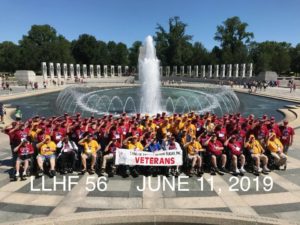
Vietnam and Me
Introduction
I am going to share about an incident that occurred almost 49 years ago that has had a significant effect on my life.
For some time now, I have realized that 1) viewing war movies or reading military books, particularly Vietnam era, and 2) talking about my combat experiences are both forms of catharsis for me. I am now progressing to the next logical step – “putting pen to paper”. I am certain that many of my friends would think that reliving these bad experiences would have the opposite effect. I guess it just erases any doubt about my being a “little strange”. I make no apologies. It is what it is, so I just “go with the flow”. Fortunately, throughout my lifetime, I have been able to successfully compartmentalize many bad experiences.
I made it back to the “real world” in fairly, good shape and have been successfully navigating through the restorative process for the last 48 years. After my return, I was able to further my education and to realize a rewarding career in research and statistics. I have a wonderful family and great friends. I must give a special shout-out to my lovely wife who has had to put-up with me for the last 29 years. Marlene is a real trouper!
I am a proud Vietnam veteran! Yes, my combat experience had a significant and lasting effect on me, but I stubbornly refused to let it define me. I am pleased to report that “this old man” is doing fine (knick-knack paddywhack … give the dog a bone). God has truly blessed me!
Part 1 (The Incident)
There have been a few events or incidents in my life that have had a profound influence on me. I have not often spoken, or much less, written about my military experience; however, the episode that I am about to share relates to one such event. Although this incident occurred almost half a century ago (August 16, 1969), I still clearly remember it well.
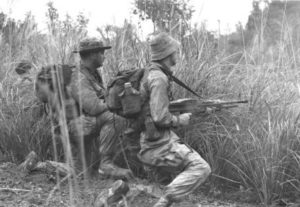
I was assigned to lead a six-man long-range reconnaissance patrol (LRRP) into enemy territory and set up a listening post to gather information about enemy troop movements. This was to be a four-day mission. Due to the nature of this assignment, stealth was of the utmost importance. We located a clump of tall bushes on the edge of an unusual clearing that was amenable to our setting up this position. The selected site was slightly elevated and was about 50 feet off the main trail. It had a good view of the surrounding area. We ensured that this location was properly camouflaged by the surrounding bushes; that our AN/PRC 25 radio would transmit properly; and that the radio antennae did not protrude above the bushes. During daylight hours, our radio-telephone operator (RTO) checked-in with headquarters every two hours on the hour from 0600 to 1800 hours. We were instructed not to transmit after dark. By necessity, our personal communications were generally limited to hand signals and our movements had to be kept to a minimum.
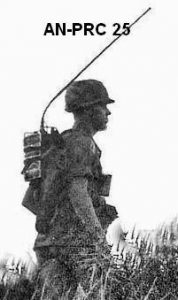
Our first day was hot, humid, quiet, and uneventful. On the second day, I awakened to a steady rainfall. It was my 22nd birthday and I celebrated by refreshing the camouflage on my face and hands with the green colored camo-stick that was a part of my LLRP kit. I devoured a G.I. can of fruit cocktail with a born-on date of 1959 to start my day. (Yes, many c-ration cans had a 50’s date on them! Does anyone have a craving for some tasty, canned, ten-year old scrambled eggs?) The remainder of the morning and afternoon was quiet with the exception of the sounds of the birds and the “rhythm of the falling rain” (apologies to the ’62 musical group, The Cascades). Our RTO signed off at the usual 1800 hours. Once it was dark, we heard distant voices. The voices became louder and then no longer sounded distant. Through our night vision goggles, we could see the silhouette figures of troops approaching. They were moving toward us in a tactical spread formation while crossing the clearing. My count was up to seven when our radio suddenly started blaring loud static! Either the radio had malfunctioned or our RTO put it on the wrong setting (squelch instead of off) when he signed off at the 1800 hour. Almost immediately, the whole area was illuminated by an enemy flare. At that point, I knew we were in deep trouble as our position was suddenly surrounded by about 20 or 25 enemy soldiers.
After taking our weapons, we were ordered to lie on the wet ground. They tied our hands behind our back and linked us together with a rope that they attached to the d-rings on each of our utility belts. We were then marched down a muddy path – a trip of about 30 minutes. We arrived at an old antiquated, fenced enclosure. It appeared to be deserted. As we passed through the gate, I surveyed our new surroundings and concluded that we must be the only captives at this facility. Also, I estimated that only a dozen guards were securing this dimly-lit prison and that it had only one guard tower and a single entrance-exit. There were two small dilapidated buildings at the back of the enclosure that I assumed were the office and the sleeping quarters for the prison personnel. I could not determine where prisoners were quartered.
We were led to the center of the enclosure. After a brief, semi-formal ceremony with prison personnel, our captors left the prison without us. Immediately, our new keepers rudely shoved us to the ground – face down and ordered us to keep our eyes to the front. After a few moments, we received our welcome to this magnificent facility which included a short, but loud, rambling oratory about American imperialism. “The U S. is an unwelcome invader of the Republic of Vietnam and will be vanished just as the French were before you. We have now fought for our independence for centuries and we will crush all enemies of the people”. Then, we were told that our cooperation would gain us favor.
The wet ground was cold and the mud tasted awful. After this oratory, we were untied and unlinked. They separated us into teams of three and each team was instructed to pick up a log about the size of a small telephone pole. Each member was ordered to place the log on his left shoulder. We were then commanded to jog smartly around the enclosure with the heavy log. Next, we were ordered to move the log to the right shoulder and jog smartly some more. Finally, we were ordered to hold the log above our heads and jog even faster. The guards had a nasty habit of hurrying us along with the butts of their AK-47’s. After a few minutes of this exhausting torture, we were planted back into the mud and our hands were retied. Then, the interrogation process began! Every 5 minutes or so, one of us would be taken to the “office”, interrogated, and then returned to our place in the mud. The only information that we shared was our name, rank, and U.S serial number. The interrogators would angrily repeat the same questions and we would offer the same stock answers. After the last of the six of us (me) had been questioned, we would again be subjected to the log-jogging routine. This process of log-jogging followed by interrogation continued until about the 0100 hour.
At my third and last interrogation, my interrogator said to me, “I do not know why I am telling you this, but we are getting nowhere and I am tired of all this. I may get locked up, but I just want this to end. Now, listen to me. At 4 o’clock this morning I will have gate guard duty. My partner, who will be the tower guard, almost always falls asleep during his duty. You probably will be able to hear him snoring. If and when you hear him, I will open the gate and leave it ajar. We are going to shut this place down anyway after you six are gone. You do not want to be here tomorrow and neither do I. If you are not here, then I can go home. I am just tired of this.”
The interrogator-guard returned me to my place in the mud. (I now was sure where detainees were quartered at this prison.) Not fully sure about the sincerity or truthfulness of his unexpected comments, I, nevertheless, passed them on to my team. Is this guard messing with us? Should we trust this guy? We all agreed that the log-jogging exercise and interrogations were getting very tiresome. Also, the ground was very wet and very cold and it appeared that it was to be our permanent cell. And, we did not know what was in store for us the next day! Like our new friend, many of the guards appeared to be indifferent to their duties and were having too much fun at our expense. We decided that it was in our best interests to assume that the guard was serious.
All six of us anxiously waited for the 0400 hour, praying that this was not a trick. We were much too anxious to steal a much-needed nap while waiting. I intently watched the changing of the guards at the 0400 hour and noted that our crazy guard friend did occupy his place at the gate. About 40-45 minutes into the hour, we did hear loud snoring (music to our ears). I peered toward the tower and then to the gate. I saw no one in the tower and I noticed that the gate was open and that our gear was lying neatly near it. Out of the corner of my eye, I saw our new guard friend approaching us slowly (almost tiptoeing) with his AK-47 in one hand and his knife extended in the other. He suddenly lunged forward with his knife and cut the ropes from each of our hands and whispered, “run quietly and do not look back!” That was a command that we could readily obey. We heard 3 shots after 2 or 3 minutes, but we never looked back for 20 minutes or so. We arrived at our headquarters at mid-morning tired, embarrassed, and with “our tails between our legs”.
At our debriefing, the officers at headquarters did not appear to be very concerned about our well-being Instead, all their questions understandably related to our sharing of any information with the enemy. Did we divulge anything? After everyone was satisfied that we provided only the standard answers, we were ordered to rendezvous with our company at 1200 hour – sleep or no sleep. Although my POW experience lasted only about 12 long hours, it certainly has had an effect on me for almost half of a century,
Part 2 (Lasting Effects)
As you surely have concluded by now, this did not occur in Vietnam. It occurred during ‘war games’ at AIT (Advanced Individual Training). The guards and soldiers were actually returning Vietnam vets that were specially trained to impersonate a VC company of soldiers and prison guards. In my opinion, these bullies took their jobs much too seriously; enjoyed it too much; and were much too rough on this particular team of friendlies. Nevertheless, an important lesson was learned by yours truly. Can I ever be a good leader?
After that fiasco, I was afforded a second chance. I was selected to attend the NCO Academy at the United States Infantry School in Fort Benning, Georgia (sarcastically called the “shake and bake” school by old-timers). In February of 1970, I commanded my second LLRP mission. This one was more successful, but I was a nuisance to my team as I was unrelenting regarding the AN/PRC 25 radio and the standard operating procedures of a LRRP mission. I was obsessed with doing everything by the book. To my RTO’s chagrin, I checked the setting on his radio several times before dark each night. My earlier experience truly had affected me! Based on that past experience, I took all the training at the NCO Academy very seriously as I knew I was headed to Vietnam
Two months later (April ’70), after a long flight from Oakland, California, I arrived in Long Binh, South Vietnam. It was extremely hot and very humid. I cannot describe the cultural shock that I experienced upon arrival. Not unlike the faux Vietnamese in the training exercises, most of the much smaller natives were clad in similar pajama style clothing and conical hats (non la). The smell of the country was like no other that I had ever experienced. It was surreal to see entire families squatting around a fire and their water buffalos grazing nearby. The crowded cities were worse than any slums that I had ever seen on TV. Almost everyone including children carried rifles. Malnourished, feral dogs and cats roamed the over-crowed streets. The extreme poverty, unsanitary conditions, and the unfamiliar language made me long for my more innocent years. When the constant sounds of artillery, bombs, and mortars were added to this scenario, I could only conclude that I had entered the “twilight zone”! I just wanted to go home.
I was assigned to the 3rd Battalion – 506th Infantry (airmobile) of the 101st Airborne which was a swing battalion. Its troops were dropped into troubled hot spots all over South Vietnam. (I was an airborne ranger, but the 101st did not jump during my tour). After five days of shadowing my predecessor, I took over as the leader of the 3rd squad of Company B. I had ten men to lead and get home safely. Although anxious, I was confident that I had been trained well at the Academy. I knew that the classroom had given me a good foundation, but I was also well aware that “real combat” could not be simulated in a classroom.
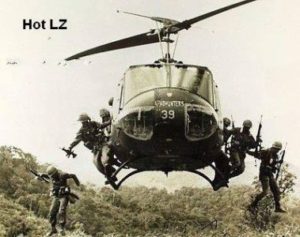
During my first three weeks in Nam, we had no contact with the enemy: however, on May 2, 1970, that changed. At 0800 hour, we boarded choppers in Pleiku, South Vietnam and headed to the Parrot’s Beak area of Cambodia. As soon as our choppers approached the landing zone (LZ), they came under heavy enemy fire. I think I was on the seventh or eighth chopper that arrived that morning. (Instead of the choppers touching the ground, they hover and the infantrymen jump from three or four feet,). I noticed that two of the helicopters ahead of me were hit by mortars and ultimately crashed. I immediately knew this was a very hot LZ! Welcome to Cambodia and welcome to real combat
After a base camp perimeter was established each night, it was a 101st Airborne standard operating procedure for one squad from each platoon to setup an ambush about 200-300 yards away from the base camp. On the third night, it was my squad’s turn (my first true test). Having flashbacks from my calamity in AIT, I asked God to calm my nerves and help me make good decisions. Fortunately, we encountered only a water buffalo that night and thankfully experienced no incidents with the radio. That was the first of many trials for me and my being able to share this proves that I must have passed all of them.
Cambodia definitely was the worst combat of my tour as we were there 10 days and had skirmishes with the enemy each day. On May 10, 1970, as we were crossing the Se San River, my platoon was ambushed and then surrounded by a well-armed NVA battalion. We called in air strikes, artillery, and gunships. We eventually were rescued by a sister company that was dropped into a LZ about 2 miles away from our location. They had to walk all night through the dense jungle to reach us in the early morning hours. Ultimately, without their assistance, we would have all perished. Unfortunately, we lost two men from my squad and 8 from our company during those 10 days. (Those deaths absolutely devastated me.) We later learned that we were at the doorstep of the largest cache of enemy food and weapons captured during the Vietnam War. That would explain why the huge enemy force was there. My unit was awarded the Valorous Unit Citation which is the unit equivalent of an individual’s Silver Star.
Today, I am obsessive about timeliness and order (just ask my wife). I reluctantly admit that I may also be too stubborn; too rigid; too opinionated; too outspoken; and much too intolerant of the anti-religion, anti-free speech; anti-flag, anti-constitution, illegal immigration, political correctness, anti-police, and socialist movements in our country (and none of these intolerances will likely change soon). My expectations of other people are much too high (too rigid). We will leave here at 6:13 PM (timeliness). I am 70 years old and you expect me to change (stubborn), Like it or not, we cannot erase history (opinionated)! Anyone supporting a socialist agenda surely has not studied history or economics (outspoken)! I cannot deny being opinionated, but I am still a very loveable, quiet, even-tempered, meek, and gentle soul. (LOL)
One might argue that some of the above examples of my attitudes and statements are consistent with a military mentality while other examples may be more related to my southern-midwestern upbringing; to my Judeo-Christian values; to my work ethic; or simply to my inherent personality traits. Or, perhaps, I am just too candid and honest. My obsession with timeliness and order can be largely attributed to my military experiences. (I still kick myself for not checking that radio setting before dark back in AIT!) How ironic is it that a AN/PRC 25 radio that was responsible for getting me captured in a training exercise was instrumental in saving my life in Cambodia. Without our radio, we definitely would not have survived.
After almost 50 years, loud, unexpected noises still startle me. The shape of some lamp shades remind me of ‘non la’ hats when I suddenly awaken at night. I absolutely abhor guns (but strongly support the 2nd Amendment). Camping (roughing it) just does not appeal to me (I wonder why?). However, I came back home more appreciative of simple things; more motivated; more attentive to detail; more assertive; more confident; more goal oriented; more serious, and more driven. Yes, war has had a lasting effect on me.
I love this country and harbor no ill feelings about being drafted or sent to Vietnam; nevertheless, I cannot deny that I have been greatly affected by that experience. In my opinion, anyone that has been in combat and contends that he or she was not affected is being rather disingenuous. Now, half a century later, I often think about my faux POW experience in AIT. Where would I be, or more accurately, would I even be if that would have occurred in Nam or Cambodia? I continually thank the Lord that I made it through that conflict without the physical, emotional, and mental scars that many of my fellow soldiers have had to endure. Many gave the ultimate sacrifice. I am now more appreciative of the simpler things in life such as clean air and water. I would like to think that I am a stronger, better person due to my service.
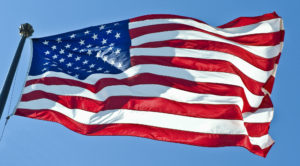 As I review the events of my life, I simply think of Vietnam as simply a dark chapter in my story. I have experienced others; nevertheless, I have experienced many more bright chapters that have helped to erase that pain. We simply were just pawns in a great debate. Unlike previous wars, many Vietnam vets came home to “‘parades of disrespect” while others came home to “walls of silence”. My homecoming was mostly the latter, but I am just thankful that I did come home! While overseas, I never underestimated the power of faith and prayer. The Lord was and still is my shepherd! May God bless the U.S.A.
As I review the events of my life, I simply think of Vietnam as simply a dark chapter in my story. I have experienced others; nevertheless, I have experienced many more bright chapters that have helped to erase that pain. We simply were just pawns in a great debate. Unlike previous wars, many Vietnam vets came home to “‘parades of disrespect” while others came home to “walls of silence”. My homecoming was mostly the latter, but I am just thankful that I did come home! While overseas, I never underestimated the power of faith and prayer. The Lord was and still is my shepherd! May God bless the U.S.A.